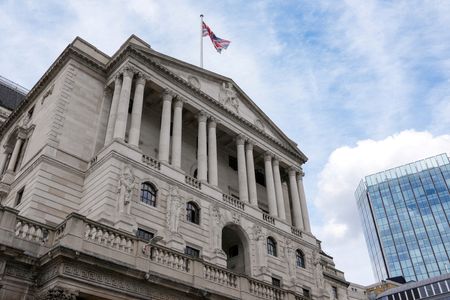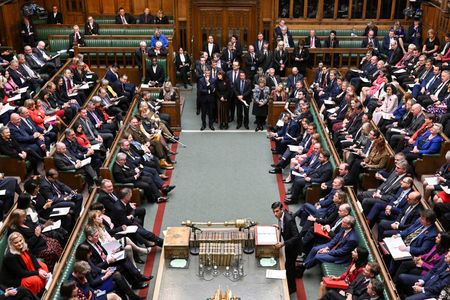LONDON (Reuters) – Britain’s government could end up paying 133 billion pounds ($157 billion) to the Bank of England over six years to finance its quantitative easing (QE) programme, official budget forecasters said on Thursday.
British banks hold around 950 billion pounds of reserves at the BoE, largely as a result of more than 800 billion pounds of reserves created to pay for QE purchases of British government bonds that the central bank is yet to reverse.
Banks are paid interest on the reserves at whatever is the BoE’s current interest rate – just 0.1% a year ago, but 3% now and they could rise further still.
Until recently, the government received profits made by the BoE’s QE programme when interest rates were low, which totalled 120 billion pounds between March 2009 and March 2022.
Those flows have reversed: now the government foots the bill for any losses the BoE makes as it pays higher interest on bank reserves issued for its QE programme than it receives from the government bonds which the BoE bought.
With public finances under growing strain from energy bill support schemes and a stalling economy, this liability – which transfers taxpayer money to banks – has come under increasing scrutiny.
“Across the forecast, the Treasury pays 133 billion pounds (to the BoE) to cover these losses, more than reversing the previous 13 years’ gains,” the Office for Budget Responsibility said in its latest forecast.
It said this figure was sensitive to both changes in the BoE’s Bank Rate and gilt prices, meaning the true figure could be much higher or much lower.
Some former BoE officials have suggested that banks should receive interest on only a fraction of their reserves held at the BoE to stem taxpayer payments to banks.
BoE Governor Andrew Bailey has said doing so would weaken the central bank’s transmission of monetary policy via the banking system.
($1 = 0.8461 pounds)
(Reporting by Andy Bruce; editing by David Milliken)


